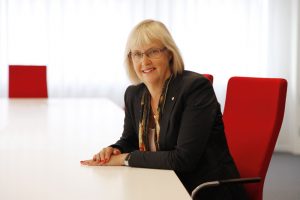Plenary Sessions
Monday, 16th April 2018; 13:40 – 14:40
Plenary 1: Shaping the New Mobility Landscape – a Vision for Transport & Mobility for Europe
Social, ecological and economical challenges and transformation processes require an efficient and sustainable mobility ecosystem. Digitalisation, automated driving, sharing mobility, e-mobility and multimodality – trends like these demand the development of a comprehensive European vision. Public authorities have the responsibility to initiate and coordinate the process towards an extensive strategy, addressing the diverse needs and interests of the future. It is a crucial proposition of TRA to reach out to various stakeholders and achieve comprehensive attendances, involving universities, industry, government as well as the public (“quadruple helix”-approach). By an active design, coordination and cooperation and the usage of existing approaches, such as roadmaps, the Transport Research Arena shapes a precise framework for the European mobility ecosystem. It also includes the establishment and the simulation of socially accepted and sustainable transport systems and economical competiveness. Plenary Session #1 offers the opportunity to clarify and harmonise ideas, concepts and strategies to best shape the mobility landscape of the future.
Speakers
- Henrik Hololei, Director General DG MOVE
- Chin Kian Keong, Group Director, Land Transport Authority, Singapore
- Young Tae Kim, Secretary General of ITF
- Nitika Agarwal, COO Apolitical
Tuesday, 17th April 2018; 10:30 – 12:00
Plenary 2: How Digitalisation Is Transforming the Transport & Mobility System
By now, digitalisation has fully pervaded the transportation sector. New digital infrastructures develop, innovative players are pushing new services onto the market and digital business models are affecting the whole sector. Increasing automation and connectivity of vehicles and infrastructure enable a wide range of potential benefits, such as pertaining to road safety, efficiency and competitiveness. But they also hold risks and challenges regarding data privacy protection and security. In general, data driven developments have the ability to improve transparency, for example in relation to planning, operation, monitoring and maintenance. Utilising the potentials of digital transformation requires the systematic involvement of users and the ensuring of social inclusion. Plenary Session #2 offers the possibility of defining future challenges as well as discussing necessary steps toward a sustainable transportation system.
Speakers
- Mathieu Dunant, Head of Innovation, RATP Group
- Georg Kapsch, CEO of Kapsch Group
- Norbert KouWenhoven, Head of Global Trade Digitalisation at IBM
- Ahmed Nasr, Head of Industry Relations – Public Sector and Infrastructure at HERE Technologies
- Eddy Hartog, Head of Unit CNECT.H2 Smart Mobility and Living
Wednesday, 18th April 2018; 10:30 – 12:00
Plenary 3: Decarbonisation & Future Growth: How to Change Our Mobility System & Remain Competetive
Below two degrees Celsius: that is what the Paris climate agreement of 2015 settled on to mitigate global warming. Decarbonisation of the transport system helps to achieve this goal. Technical, regulative and social challenges are waiting along the way and need to be addressed within the next decades. A paradigm shift enables innovative solutions concerning increased traffic demand, individual and social needs and economic competitiveness. Disruptive trends like e-mobility, automated driving, sharing mobility and C-ITS also play a major role in this scenario. Therefore a framework for sustainable business models and a foundation for economic growth need to be created. Integrated strategies, innovative technologies and standardised monitoring mechanisms for an efficient and successful decarbonisation of the transportation system will be discussed in Plenary Session #3.
Speakers
- Keynote Gerd Schuster, Vice President Research, New Technologies, Innovations at BMW Group: “Towards sustainable mobility on European roads”
- Lena Erixon, Director-General Swedish Transport Administration
- Clemens Först, Spokesman of the Board of the Rail Cargo Austria AG
- Alan McKinnon, Professor at Kühne Logistics University
- José Mendes, Deputy Minister for Environment of Portugal
Thursday, 19th April 2018; 12:45 – 14:15
Plenary 4: Shaping Future Transport Research in Europe
There is a need for long-term oriented research programmes – within Europe as well as national. Innovation, research and development and their facilitation enable an adequate response to challenges like climate change, digitalisation, securing and improving social welfare, ensuring competitiveness and coping with the generally accelerating dynamics across all fields. To guarantee an actively shaped and sustainable European transport system it is important to establish clear defined objectives and back up structured approaches financially and with specific monitoring indicators. Innovative and unconventional research methods like living labs, urban mobility labs, open innovation and co-creation approaches contribute to the establishment of new principles of governance, technologies and organisations. To improve innovation dynamics, Plenary Session #4 offers the possibility to discuss the future outline of transportation research and to define the contribution of different research and funding approaches for the transport system of the future. Challenges and problems, already up for discussion within the previous plenary sessions, will be addressed as well.
Speakers
- Hans Joachim Schellnhuber, Director of the Potsdam Institute for Climate Impact Research (PIK) Senior Research Fellow at the Stockholm Resilience Centre
- Sergio Barbarino, Chariman of ALICE
- Anne Berner, Finnish Minister for Transport
- Neil J. Pedersen, Executive Director, Transportation Research Board
- Signe Ratso, Deputy Director General, DG Research and Innovation, European Commission
Last updated : 17/04/2018








